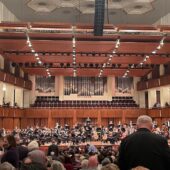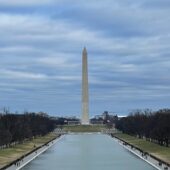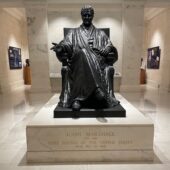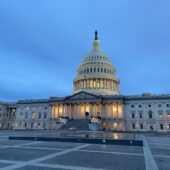Out of the Minor Chords, The Major Chords of Washington, DC
by Will Gardner (’24)
Two weeks ago, I visited the John F. Kennedy Center for the Performing Arts for a performance by the National Symphony Orchestra. The concert featured orchestral selections from Wolfgang Amadeus Mozart and Johannes Brahms’ Symphony No. 2. I was particularly struck by the second movement of Brahms’ Symphony: Adagio non troppo.

At the beginning of the movement, a solo section from the strings emerged, forcefully playing in the minor scale before a brief interlude in which the winds joined them in a playful major chord harmony. Much of Symphony No. 2 is conducted in D Major, an instrumentalist’s delight. However, the minor thirds played in this particular section of the Symphony offered a moment of reflection to focus on the tension, the seemingly unmatched harmonies between the strings and winds colliding with animosity and imbalance. However, when the strings broke free from the minor thirds, the orchestra played with wonderful rapport, complimenting each other in resolving harmonies, resulting in a sweet and gentle major chord resolution upon the movement’s conclusion.
Coming into this semester, I was unsure whether I had made the right decision in coming to Washington, D.C. I asked myself whether leaving Wake Forest for a semester would be the best choice for my academic, professional, and personal pursuits. Will the Wake Washington program provide a stepping stone for my professional endeavors? Would my internship at Mercury Public Affairs, a global public strategy firm, live up to my expectations and be a meaningful and fulfilling experience for me? Uneasiness and uncertainty arose at the beginning of this semester, a tension that swelled my chest, not knowing what this semester would bring for me.

Throughout much of my life, I have asked myself where I am most equipped to pursue life’s work, as my late uncle Jonathan Moore, the first full-time Director of the Institute of Politics at Harvard’s John F. Kennedy School of Government and the United Nations Coordinator for Humanitarian Affairs, described that is “transcendent of oneself, rooted in agape love, and in pursuit of the common good.” Despite its political competitiveness, I quickly realized that Washington, D.C. provides a foundation for rich engagement of this higher calling.
Throughout my time at Mercury, I have engaged in meaningful work rooted in Confucianism, an unwavering sense of moral responsibility and benevolence to the clients we represent. From tracking think tank events exploring the United States’ strategic competitiveness with China and the Middle East to providing critical information from congressional hearings on agriculture policy, clean energy initiatives, and American military families, my work is diverse but rooted in the same objective: to provide guidance for our clients with moral objectivity and steadfast commitment to pursuing the common good.

But perhaps the greatest “major chord” I have struck this semester has been my intellectual and personal growth in ways I never thought was possible had I stayed on campus this semester. This semester has taught me a great deal about prioritizing my time by staying on task, producing meaningful work, and caring for my well-being. By steadfastly committing to excellence in my everyday pursuits in D.C., I feel I am thriving in ways I can replicate in my daily on-campus routines next fall. Many previous Wake Washington alumni have told me that you determine how you want your experience to be in D.C. There is something about D.C.’s tapestry that has made me feel invigorated at Mercury, in the classroom, and in my everyday routine, lighting a fire inside me I never expected to burn.

Life is filled with frequent transition and uncertainty, minor chords that clash with our comforting harmonies and life’s stasis. But the minor chords we go through in life often lead to some form of major chord resolution, a new equilibrium that projects us into a path we least expect to travel. This has been my experience in the Wake Washington program this semester. Through vigor and resiliency, a newly found intellectual and personal prowess, and an unmatched internship experience committed to perpetual moral leadership, I have found a new harmony in Washington, D.C. – a harmony fervently shaping my life’s intellectual, professional, and personal journey in the pursuit of unshakeable agape love and yearning for the common good.
